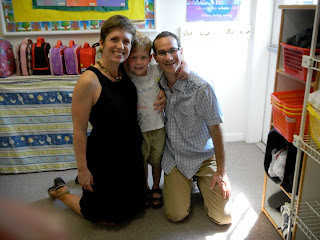Each Friday morning, children and families arriving to
school at the Bernice B. Godine JCC Early Learning Center
My office sits next to the entrance to the preschool and
I’ve come to anticipate both the glee that Friday morning challah brings, and
the oft-repeated conversations of parents and caregivers Mondays through
Thursdays, patiently explaining to eager toddlers and preschoolers: there’s no challah today, sweetie, it’s
Tuesday.
These repeated exchanges illustrate for me at least a few important
points about toddler development:
Toddlers learn through the five
senses: seeing, hearing, smelling, touching, and tasting. Spiritual practices that engage the
senses have the greatest impact. Toddlers who cannot yet articulate the word
“challah” recognize it by sight, taste, and smell. A simple song like Shabbat Shalom (Bin Bam)
indicates that “Shabbat is Here!” (another musical hit with the toddler and
preschool set).
It doesn’t take much
to make a big impact. But it does take repetition and routine. I’ve seen many a toddler sing “happy
birthday” to the Shabbat candles. If
Shabbat candles were as common as birthday candles, it will be the
opposite.
Young children have
not yet developed a sense of time. “Yesterday,” “next week,” and “Friday”
are not yet meaningful concepts. Harried parents already know this: think of
the futility of telling your toddler you need to leave in five minutes, or ten.
Toddlers live fully in the “now,” in the present (an enviable spiritual state,
but frustrating when you are late for work!).
Ritual is one way that we help mark time for young children. Repetitive
ritual creates consistency and feelings of safety and security.
What children (of all
ages) want and need most of all is the whole-hearted attention of loving and
caring parents and caregivers. The Sabbath gives us permission to set aside
the to-do list and everyday stresses, to stop being productive. Whether you
make challah from scratch using your great grandmother’s beloved recipe or can
barely manage to defrost a mini bagel from the freezer, who you are, right now,
is more than enough.
My fifth point speaks not to what is
developmentally-appropriate for toddlers,
but rather, what is “developmentally-appropriate” for families with toddlers:
It’s natural that parents of young children feel that they
have little time for themselves, or for their partners.
Taking time for
yourself as an individual helps you to be the loving parent – loving person -
you wish to be. Everyone tells you
to get more sleep and exercise. I want to encourage you to pay attention to
your intellectual and spiritual needs. Make time to talk with peers and with
your partner about what matters most, not just what’s most urgent. These are the conversations that strengthen
your family and feed your soul, and if you’re partnered, will remind you of why you fell in love in the first place.
Each Fall I meet with parents of young children in the ten
week course Parenting Through a Jewish
Lens www.hebrewcollege.edu/parenting.It’s
never simple for individuals or couples to carve out time to take the class –
even with the free on-site babysitting – but once there, they find that the
Jewish wisdom we explore can transform their personal and family journeys.
Rabbi Julie Zupan serves as the Jewish Family Educator for
the Early Learning Centers of the Jewish Community Centers of Greater Boston (http://bostonjcc.org/Home.aspx) and
is on the staff of Reform Jewish Outreach Boston (http://www.reformjewishoutreachboston.org/).
She is an instructor for Parenting
Through a Jewish Lens, a ten week course offered by Hebrew College


